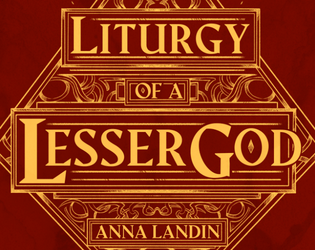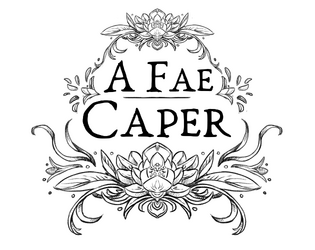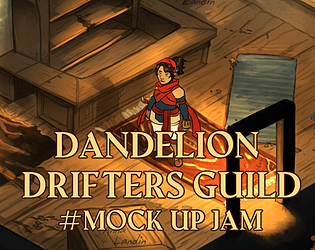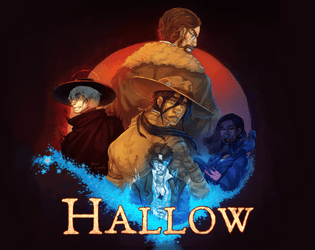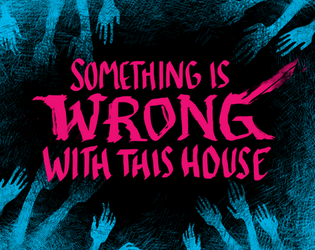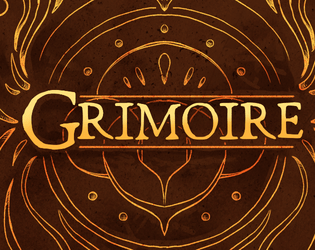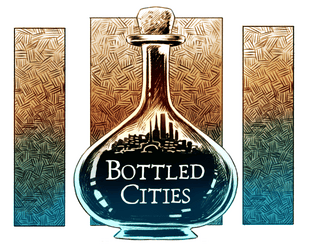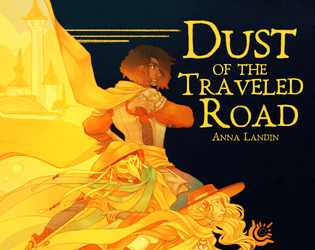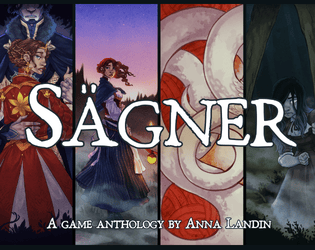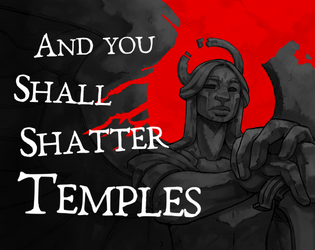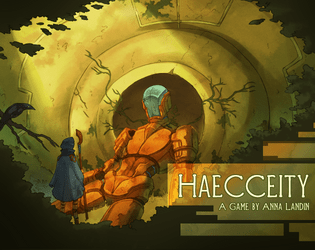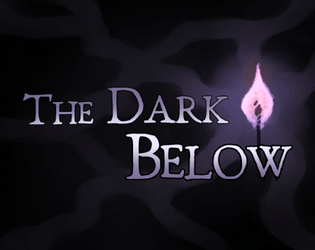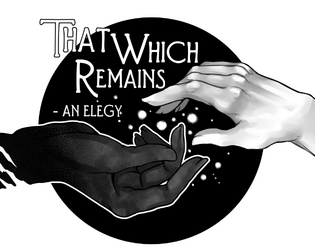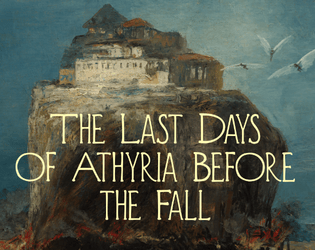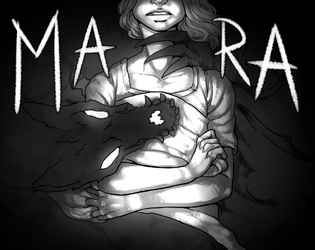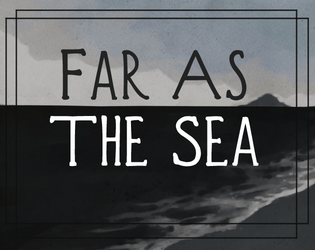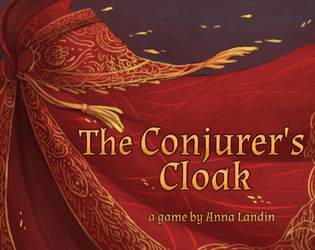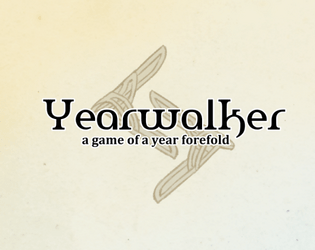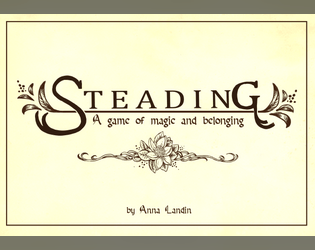Hi! I'm glad to hear you're enjoying our game!
There are physical copies available, but currently only in limited manner. My co-creator, Jonah, has them printed in small batches and sold at conventions in the UK. They have also been available in limited numbers via the Forbidden Planet store in Glasgow, though I am not sure how many they still have in stock right now.
We haven't printed any larger runs, nor have we sorted out any international shipping. It's uncertain if we will, as the logistics are somewhat complicated and shipping costs are very high.
Anna Landin
Creator of
Recent community posts
I'm very glad to hear you and your friends have enjoyed the game so much!
Our policy on fan content is that we encourage it, as long as some credit is made to the original game, and as long as you don't replicate the main rules in your own creations. SiWWTH has no Systems Reference Document at the moment, so we trust you to make the distinction between our work and your own with care and responsibility. Whatever you create should be in some way different from what we've made.
But yes, creating things like new settings, new monsters to play, and new abilities and mechanics is totally okay! We'd love to see it, so please do let us know if you make something!
Hi! For the $10, you get the base game, The Dark Below, with all of the general rules for creating characters, rolling the dice, meeting challenges and playing the game. In Shades and Echoes, the supplement PDF, you get both some broad advice on how to structure different types of adventures through the Dark, as well as a collection of locations, threats and NPCs your players can encounter along the way. You're free to use those as-is, or tweak them to suit your game. Building your own challenges from scratch based on these examples as templates is fairly simple!
I hope that helps. :)
I've been playing this game on lunchbreaks for most of the week, and have had a wonderful time figuring out good patterns. Today, I finally managed to beat the king, with this build! It took a lot of nerve and patience to simply sit there and let my armour and spikes build up, but I got there in the end! 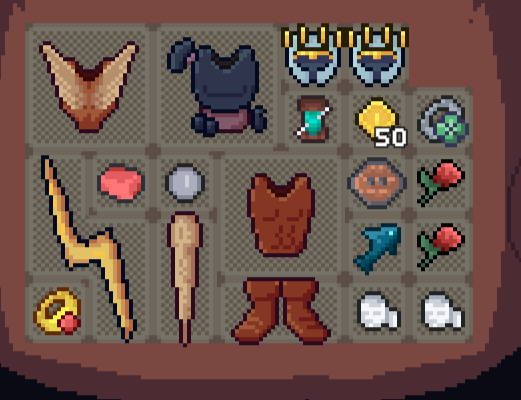
Oh wow, I would be very flattered if you wanted to play this on your podcast! Thank you so much! Crediting me by name - Anna Landin - works perfectly fine, along with the name of the game and the itch-link. I will eventually have to think about some sort of branding for this page, but for now, just my name is the way to go.
They're making one ladder and climbing down it? *I* would probably say that's a single roll, mostly in the interest of keeping things moving. But if you want more tension and peril for your players, then individual rolls are fine too!
It all depends a bit on what sort of mood and atmosphere you're going for in your session.
During playtesting, both when I have run this and when others have run it for me, we have usually limited the number of attempts to overcome a challenge to one or two. You are of course free to do as many tests as you wish, but I find that letting the consequences of failure change the circumstances and maybe divert the players' path, or require them to try a radically different solution, ends up being more interesting.
If a natural consequence of a failed roll is death, you can let that death ride, if your player is okay with it - but you are also encouraged to think up alternate solutions. Maybe your player drops into the chasm and gets separated from the rest of the group - but they end up falling into a strange pocket dimension of darkness, or maybe they land on something soft and find out they're in a labyrinth of narrow caves, or maybe they blink and find themselves somewhere completely unexpected.
The Dark Below is meant to be a twisty, surreal fantasy of a journey, which means that the normal, mundane consequences of physics don't always need to apply - unless you want them to.
Best of luck with your game!
Thank you so much for these very kind words, Kumada! I am so very glad you enjoyed The Dark Below. This is a fantastic review!
Regarding dungeon generation - I do have notes on adding some advice and rules for generating dungeon-challenges that might get added to the core rules in a future release, though I have yet to decide how expansive I want them to be. The rules for the physical layout of the dungeon are kept light on purpose, to allow for adjustments on the fly, and to allow character-players to draw the map as they discover it - and to emphasise the strange, nightmarish quality of the environment. But I realise that there might need to be some more support for dungeon-creation from the GM's side.
And re: your minor issues
- thanks for picking up on that missed word! I'll fix that for the next revision
- In the first paragraph of Traversing the Dark, it is stated that you need a twelve-sided die to play the game! : "To play, you will need index cards or something like them for each Exile, a twelve-sided die to roll, and something on which to draw the map."
I'll have to consider re-phrasing some of the rules to repeat the fact that you're rolling a d12, just for the sake of clarity.
Thank you for doing this. Here is my submission: https://annalandin.itch.io/the-dark-below
Squeaking in under the wire of June, I just released Far As the Sea - a set of three small games about the melancholy sea, written as part of the Rolling Waves jam. They can be played as a set, or separately.
You are a traveller, crossing a lonesome sea with a ragged crew. You are a siren, singing your sea-song.
You are a wanderer upon the shore, greeting the ghosts the tide brings you.
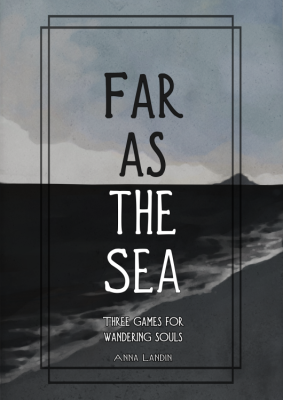
I just released The Conjurer's Cloak, a storytelling game for 3-5 players about the tyranny of magic and what we do to escape its cage. It was written as part of the Big Bad Game Jam 2019.
It's priced at $5, but if you are experiencing financial hardship, please reach out and we can work something out.
I just released Yearwalker, a card-based solo rpg about divining the future, for the Folklore Jam!
Your path will take you to the crossroads tonight, across field and forest, over rivers and under the boughs of trees; over graves and sacred ground alike. Before the day dawns you will face many dangers, and you have come prepared. You have told no one where you are going, and you have kept your silence this day. Now, as the night falls, it is time.
You are a soul in search of answers in the dead of night, and this is your Year Walk.
Yearwalker is an introspective solo rpg about divining the future and encountering the supernatural. It is inspired by Scandinavian folklore and tradition, and was written for the Folklore Jam. To play it, you need a deck of 52 cards, perhaps something to write with, and a bit of quiet.I also made a custom deck of illustrated cards to go with it, featuring a ton of different creatures and objects from Scandinavian folklore, because I have no chill.
There are online drawing tools that would allow you to draw this in real time on a shared map - Drawpile comes to mind, and it IS possible to draw in Roll20 as well, although the drawing tools are very very basic.
If you want to keep a record of the stages of development, you could just take screenshots of the map regularly.
Legacy: Life Among the Ruins has a really neat move for The Serene Choir Family playbook, called Divine Grace, which lets you essentially write your faction's holy texts commandment by commandment over the course of the game, based on the actions you take, the actions taken by other characters, and the emerging fiction. It's a neat way to guide your own idea of what your faction values, as well as providing an emerging set of rules that might dictate how your characters are likely to act - and what they might be tempted to go against.
"Why define the framework at all?"
because as with all active creative pursuits, the creation of games is a conversation - not just between creators as a literal conversation, but with the medium itself as a more metaphorical one. And when carrying on a conversation, defining your terms is helpful.
imho, the main hinge on which Belonging-games turn is that they center marginalised communities outside of a dominant culture - both thematically and in the playing itself. That matters, and is worth defining - whether you then want to get into the weeds of specific mechanics or not. And it matters because of the underlying history of marginalised communities being, well, marginalised. Making your general design philosophy something that cares about, and values, marginalised communities at the edges of society is important - for the same reason that caring about marginalised communities in other aspects of life is important.
As a general design philosophy, "this game cares about the marginalised" is a good thing to have expressed clearly in the foundation of the thing you're making. It's a statement of intent, and a guiding principle. Compare it, if you will, to the underlying philosophy of art movements: surrealist art was - and is - a broad range of different things in terms of modes of expression (painting, sculpture, writing, etc.), but it is all united in a core philosophy and intent.
Belonging-games - and indeed any other classification of games - works kind of the same way. It's less about the specific mode of expression, and more about your aim and intent as a creator.
And re: PBTA as a classification - aside from it being an IP policy, afaik it is also defined as any game made as a reaction to PBTA in general. Which means that following that logic, even if you make something that is an explicit and intentional rejection of things contained in another PBTA-game.... you're still making a game that fits into the messy family tree of PBTA-games. But it's also entirely up to you if you WANT to define it that way.
.... tabletop rpg cladistics sure are a messy thing to sort out, huh.
it has been 84 years since I played Pokémon, but the things I remember enjoying from the videogames were:
- exploring the world and solving the occasional puzzle
- filling in my pokédex (i.e: meeting new pokémon)
- reading the lore in each 'dex entry (yes, I was that kid)
... so, the battle mechanics were something I engaged with because I had to, but for me, the exploration and discovery were definitely the biggest joys. So a ttrpg that managed to incorporate some of that joy of world-discovery (for worldbuilding, may I recommend having a look at Ryuutama's collaborative town-creation sheet for inspiration? I've used it in other systems too, and it always gets players engaged in and caring about the world they're playing in), and the discovery/collection of creatures would be sweet.
It might be a lot of bookeeping, as you say, but providing not just a pre-existing beastiary, but also a way for GMs/players to create more creatures of their own to fill out the world would be neat? That would mean you wouldn't have to invent hundreds and hundreds of creatures yourself - just a good basic collection - and it would give players the means to flesh out their own settings and make them more personal.
Some players might be after the battle mechanics modelled on Pokémon's own, but I would personally find that a bit crunchy in ttrpg format. It works in videogames, but it's a LOT to keep track of at the table. Like, I even played Pokémon White with an actual printed out chart of type-advantages because I couldn't keep all of that stuff in my head.
Yeah, step 3 is the most important - getting a feel for what a game is helps you sort it into "I want to play this" or "this was neat to read, but I won't play it" pretty quickly.
and re: step 5 - may I recommend trying to find a correspondence course? not everyone is lucky enough to have the dark forces lurking conveniently nearby to make pacts with
oh gosh, where to start. I have entirely too many characters to list in a single post here. Let's try to keep this manageable, and pick just a few, I guess? Focusing on the ones I play actively right now.
Asherah 'Ash' Corvo (7th Sea)
The child of an eclectic family made up of many aunts and even more cousins, Ash took to piracy early - the way anyone does, when they're born in the pirate haven of Aragosta in the Atabean Sea. Serving for several years as a deckhand and lookout aboard the Red Wraith - commanded by the indomitable captain Mala Wake - Ash now finds herself the newly minted captain of the Woe Betide, reluctantly commanding a crew made up of ragtag mainlanders, rebellious Atabeans, and a handful of ghosts.
She did not leave her old crew on good terms - she was cast away into the sea on purpose, marooned on a rocky island with four others, wasting away until she was the lone survivor. Desperate to live, she made a foolish deal with the Devil Jonah, clawing strips of skin from her arms and giving it to the sea in sacrifice, chipping away a piece of her soul to give him. In return, he gave her the means to walk away from that spit of rock alive. She may regret her deal, but the Devil's gifts are not so easily given back.
Driven now by anger, and a desperate need to know WHO it was that cast her away to die in the first place, she now searches desperately for her former crewmates.
Pharos Olana (D&D 5e)
Life in Thera - the vast valley surrounded by mountains where their ancestors were stranded a few centuries ago, after a planar mishap, the details of which have been lost to time - is one of exploration and discovery; a life Pharos has leapt into without thinking twice. He's a bright, friendly young tiefling*, and a newly minted member of the Guild of Seekers, whose job it is to map the lands, and discover what secrets it may still be hiding. He's only just begun, but between the giant construct and the strange artifacts he and his team mates just found, they're off to a good start!
*) Or, well. He's a tiefling, right? Everybody else in his family is a tiefling. His twin brother is a tiefling. His big sister is a tiefling. So are both of his parents. And tieflings are all a little different from each other - so what if he can't seem to get the hang of spitting hellfire the way his family can, and so what if the only thing he seems capable of making with Thaumaturgy is a bit of bright, glowing light? It's just that he's not very inclined towards magic. It's no big deal**.
**) Except that it is, actually: he's an aasimar. He just doesn't know it yet.
Rue Alder (Ryuutama)
A little deergirl born and raised in the little village of Zelkova, in a country covered in vast, ancient forests, Rue made a promise with her childhood friends - one day, they would all reunite under their Promise Tree, and tell each other stories of their adventures. Her friends left, one by one, to explore the world outside the forest - one went into the vast desert, one went to seek an education in magic at the finest university in the world; one went to Orbinium, the floating isles of ingenuity and invention - but Rue stayed closer to home. She explored the forest itself, and learned the craft of medicine and healing - and for a few years, she looked after the Promise Tree, waiting for her friends to return, missing them all terribly.
... and on the eve of the day that they all did, they found their Promise Tree stolen away right before their eyes by some unknown soldiers, clad in strange armour. Swept up in a quest to get their precious Tree back, Rue is discovering that the world outside her beloved forest is much larger - and much stranger - than she ever thought possible. And she is only just beginning to realise - with a bit of dread - that this quest might be much larger, and much more important, than just her and her friends and their lost Tree.
... not included on the roster of active characters: Ianeira, the sea nymph, trying to make her way out of Hades to reunite with her loved ones. Skipped over mostly bc I've only played one session as her so far.
1. Build community and personal connection. None of us are going to get through this alone.
2. Be kind. It's a cold hard world out there; make it less so.
3. Find your space, and make some for others - especially those living on the margins.
4. Fight back against injustice and oppression. In any way that you can.
Well, hopefully Mystery Individual #1 keeps working on that hack!
and gosh, reading Polaris *instantly* made me made me want to play it. I haven't had the opportunity yet, but I've kept my eyes on other people playing it, and am definitely conspiring to get around to it myself some day. And there are SO many directions you could take a hack in - swapping the setting for a different doomed community, swapping the Knights for some other group, even throwing out the doom and tragedy altogether and just keep the way Polaris handles authorship and control of characters and how they relate to each other, or simply the pattern of key-phrases and responses.
I know of at least one person who has a hack of The Quiet Year in progress! It's not out anywhere yet, but I've seen a draft - it's about building a cosmology, rather than a ground-level community, which I thought was a neat way to branch off of that.
Personally, I think my pick would be:
- Polaris: the way it structures the flow of play, and how players divide the control of characters between each other, is really interesting, and seeing the same kind of structure taken into different genres and in different directions would be neat. I know of one hack where the viewpoint was reversed, so that rather than playing a chivalric Knight, you played as the Mistaken, the threatening force, but I'm sure more could be done with it.
Ryuutama by Atsuhiro Okada is a game about journeys, where the way there is just as important as the goal itself. It is thoroughly delightful, with one of the quirkiest spell-lists I've seen in any game, a simple but elegant dice system, and some of the most inviting presentation I've ever come across. Simply reading the rules is a good experience.
Step 1: buy and download the thing.
Step 2: shove it somewhere in my misc. ttrpg systems folder, with subfolders organised by system (for the ones I've played/have solid, scheduled plans TO play soon) or somewhere in the general Rule-systems subfolder: 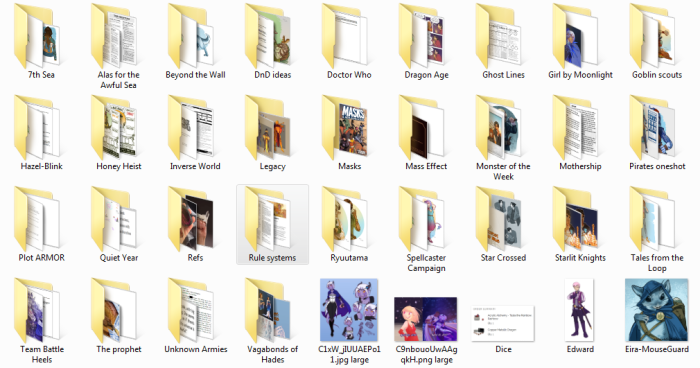
Step 3: if it's a short game, read it immediately. If it's a longer game, read the intro and skim large parts of the rest to get a feel for the system.
Step 4: yell about it to friends so that they get excited too, and get roped into playing it with you.
Step 5: practise dark magics to bend timezones and schedules to your will, so that you actually get to play it.
Step 6: get intensely enthusiastic about it and draw your character/related art, before and/or after the game is played. more yelling excitedly about it is optional, but encouraged.
Step 7: give feedback if people want it, but be incredibly likely to forget about this.
repeat as necessary.
On a serious note: steps 1 and 3 are probably the most important here: download the game, and look at it. If it's small enough to read in just a few minutes, take the time to do so right then and there. If it requires a bigger time-investment, read the intro, and skim as much of the rest as you can, just so you can get a feel for it. It's much easier to motivate yourself to find the time for a proper read if you've actually taken the time to look at it first, instead of leaving it sitting around unopened and unread.
I have not used it myself, but I have heard positive things about World Anvil from other people. It seems to have tools both for worldbuilding in general, and organisational tools for campaigns and GMing.
Several of the campaigns I'm in have used/are using Trello as an organisational tool to keep track of characters, locations, NPCs and plot-hooks - it's a pretty handy way of keeping track of what's been happening, and sharing information with players.
Alright, time to roll up my sleeves and spout some stuff for your lists!
Biomes:
Tundra, lakelands, coastal regions/strandflats, shrublands, highlands, stony tors, dark pine forests, icefields/icecaps
Settlements:
in hamlets, in floating towns/on house boats, in yurts, in hillforts, in cottages, in vast caves, in stockades
Authorities:
the city council, the merchant company, the town elders, the local baron, The Prophet, the general, the warlord, the local magistrate
Antagonists:
a rival township, a local hedgewitch, troublesome settlers, a mining company, a rogue military unit, a criminal gang/organised crime network
Issues:
land rights, grazing rights, legal jurisdiction, the building of a bridge, right of safe passage, tolls, taxation, religious freedom
Complications:
pirates, a nest of vipers, a pack of hungry wolves, rogue wizards, a warlock, a haunted ruin
Jobs:
loot and pillage, defend the locals, occupy the area, root out troublemakers, pacify the locals, depose a local ruler, hunt down a criminal
Tilts:
supply lines were cut, intel was bad, we lost our scouts, a terrible storm struck, natural disaster,
Big Tilts:
our employer betrayed us, our real enemy was someone different, the authorites and antagonists were conspiring together
.... I hope those are useful to you!
Re: general feedback. You've obviously got some time-skips in the narrative you're setting up with this bot - telling the entire story with all the twists and turns through a bot would be tricky in any case - but to my eye the transition from job question->setup question->tilt question looks a little bit abrupt? Perhaps it's worth having some sort of positive reply from the bot after the player has specified what the job is, and maybe something to fill the gap between the setup ("everything is in place and looking good!") and the tilt ("oh no we've been through something terrible")?
It doesn't need to be a big thing: just something to bridge the gap between everything being fine and everything having gone terribly.


